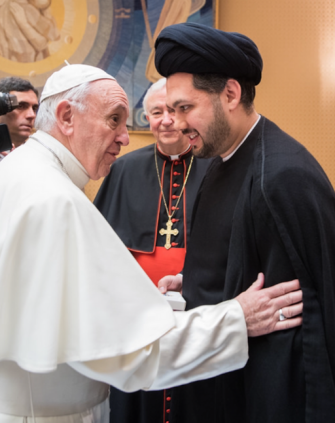Mary – Maryam 2
Bible
There is nothing in the gospels about the upbringing of Mary. The Church relies on the apocryphal Book of James (the Protoevangelium) for its information, even for the Feast of the Presentation of the Blessed Virgin Mary which the Latin Church celebrates on 21 November.
According to this book, Anna had promised to God the child she would bear.
When Mary reached the age of two years, Joachim wanted to offer her to the Temple, but Anna said “let us wait until the third year, that the child may not long after her father or mother.” Joachim agreed. So when Mary was three, her parents took her to the Temple. The priest received her, kissed her and blessed her, and “he made her sit upon the third step of the altar. And the Lord put grace upon her and she danced with her feet and all the house of Israel loved her.” Her parents marvelled, praising God that the child had not turned back. “And Mary was in the temple of the Lord as a dove that is nurtured: and she received food from the hand of an angel.”
So Mary is brought up in the Temple until she was twelve, the age of puberty. Then the High Priest whose name according to the Protoevangelium was Zacharias had to decide what to do with her. An angel appeared to him, telling him to assemble widowers, each one bringing a rod,” and to whomsoever the Lord shall show a sign, his wife shall she be.” The widowers brought their rods, gave them to the High Priest who, after having prayed, gave them back. “Joseph received the last rod: and lo, a dove came forth from the rod and flew upon the head of Joseph.” So Joseph was designated as the husband of Mary.
Qur’an
Mention in the Scripture the story of Mary. She withdrew from her family to a place east and secluded herself away (Q 19:16-17).
Yusuf Ali comments:
“To a private eastern chamber, perhaps in the Temple. She [Mary] went into privacy, from her people and from people in general. For prayer and devotion.”
Her Lord graciously accepted her and made her grow in goodness, and entrusted her to the charge of Zacharias.
Whenever Zachariah went in to see her in her sanctuary, he found her supplied with provisions. He said, “Mary, how is it you have these provisions?” and she said, “they are from God: God provides limitlessly for whoever He will” (Q 3:37).
Zacharias has already been mentioned in this sura as the future father of John the Baptist (Yahya). Since Islam has no priesthood, there is no role for Zachary, the High Priest, to play. The two persons are conflated into one.
There is no mention either of Joseph, though we find this in the Qur’an:
You [Muhammad] were not present among them when they cast lots to see which of them should take charge of Mary, you were not present with them when they argued [about her] (Q 3:44).
This silence about Joseph is probably to preserve Mary intact from any suspicion of having sexual relations.
The Qur’an states:
Mary, daughter of ‘Imran. She guarded her chastity, so we breathed into her from Our Spirit. She accepted the truth of her Lord’s words and Scriptures: she was truly devout (Q 66:12).









Make A Comment
Comments (0)